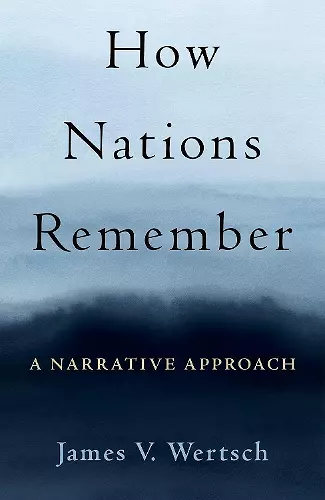How Nations Remember
A Narrative Approach
Format:Hardback
Publisher:Oxford University Press Inc
Published:8th Oct '21
Currently unavailable, and unfortunately no date known when it will be back

How Nations Remember draws on multiple disciplines in the humanities and social sciences to examine how a nation's account of the past shapes its actions in the present. National memory can underwrite noble aspirations, but the volume focuses largely on how it contributes to the negative tendencies of nationalism that give rise to confrontation. Narratives are taken as units of analysis for examining the psychological and cultural dimensions of remembering particular events and also for understanding the schematic codes and mental habits that underlie national memory more generally. In this account, narratives are approached as tools that shape the views of members of national communities to such an extent that they serve as co-authors of what people say and think. Drawing on illustrations from Russia, China, Georgia, the United States, and elsewhere, the book examines how "narrative templates," "narrative dialogism," and "privileged event narratives" shape nations' views of themselves and their relations with others. The volume concludes with a list of ways to manage the disputes that pit one national community against another.
Informed by insights from linguistics, anthropology, philosophy, and social psychology, this volume explores narrative templates that condition the articulation of national memory. * A. Vari, CHOICE *
In this elegantly written book, James Wertsch makes a compelling case for national memory as a force to be reckoned with. Rich with examples from Russia, China, the U.S., and Europe, How Nations Remember brings home a tremendously important point: No matter how well-informed and cosmopolitan-minded you may be, national memory will inform your worldview, and its tenacious narrative templates will deeply shape the way you remember the historical past. * Astrid Erll, Professor of Anglophone Literatures and Cultures, Goethe-University Frankfurt *
James Wertsch's brilliant compendium How Nations Remember includes 'memories' that have been factitious but powerful for propaganda. For example, Vladimir Putin has pounded into the Russian paranoid psyche the myth for decades that the U.S. and NATO deliberately undermined the USSR. The fact was that Western governments tried to help Gorbachev in the Kremlin and keep the Soviet Union intact. Another example that Wertsch uses: during the Kosovo War, NATO bombers mistakenly attacked a building in Belgrade where Chinese intelligence officers were stationed. The State Department immediately sent a high-level diplomat from Washington to Beijing to apologize. He was rebuffed, and the Chinese stayed with the sinister plot to this day. * Strobe Talbott, Former U.S. Deputy Secretary of State and Former President, Brookings Institution *
A masterly study of the 'narrative templates' that underlie the stories nations tell themselves with a tenacity that triumphs over historical time and truth. Combining analytic acuity with striking examples from Russia, China, and the United States, the book provides an eloquent and persuasive account of national memory, both fascinating and significant. * Carol Gluck, George Sansom Professor of History, Columbia University *
Jim Wertsch has written a tour de force theory of human collective memory organized at the level of nation states. It is as current as the evening news, as historically grounded, true to life. It is as if the text was coming alive on our screens. A great contribution to sociocultural studies and beyond. This book could not be timelier if it had arrived via Twitter. I read the manuscript just as the two major U.S political parties were holding their conventions. As the pundits told us repeatedly, we would witness the struggle to control 'the narrative' of this moment in history. What ensued on the world's billions of screens was a textbook illustration of the very principles that Wertsch described in this book. A major accomplishment. * Michael Cole, Emeritus Distinguished Professor of Psychology and Communication, University of California, San Diego *
With citizens taking to the streets to insist that their countries confront their troubling pasts, this book could not be timelier. With his characteristic incisiveness and from a cross-disciplinary vantage point, Wertsch examines the ways different nations construct renderings of their past that often differ radically from each other and why these distinct renderings are often taken as 'truthful' and maintained with such tenacity. His adoption of a narrative approach to these issues provides insight into the underlying psychological dynamics and offers measures to mitigate the conflicts that disparate renderings of a nation's past often engender. The book is required reading for anyone interested in how memory animates and shapes national identity and actions. * William Hirst, Malcolm B. Smith Professor of Psychology, New School for Social Research *
ISBN: 9780197551462
Dimensions: 217mm x 148mm x 23mm
Weight: 454g
280 pages